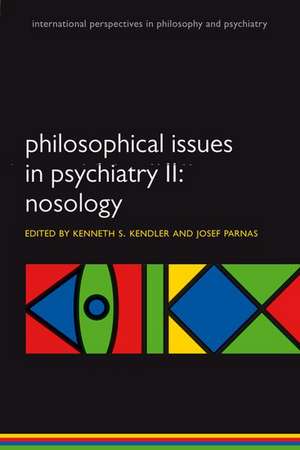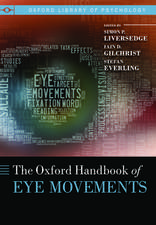Philosophical Issues in Psychiatry II: Nosology
Editat de Kenneth S. Kendler, Josef Parnasen Limba Engleză Paperback – 19 apr 2012
Preț: 432.12 lei
Preț vechi: 595.96 lei
-27% Nou
Puncte Express: 648
Preț estimativ în valută:
82.71€ • 89.87$ • 69.52£
82.71€ • 89.87$ • 69.52£
Carte tipărită la comandă
Livrare economică 11-17 aprilie
Preluare comenzi: 021 569.72.76
Specificații
ISBN-13: 9780199642205
ISBN-10: 0199642206
Pagini: 360
Dimensiuni: 155 x 233 x 20 mm
Greutate: 0.54 kg
Editura: Oxford University Press
Colecția OUP Oxford
Locul publicării:Oxford, United Kingdom
ISBN-10: 0199642206
Pagini: 360
Dimensiuni: 155 x 233 x 20 mm
Greutate: 0.54 kg
Editura: Oxford University Press
Colecția OUP Oxford
Locul publicării:Oxford, United Kingdom
Recenzii
The quality of writing and argument is uniformly excellent and the style is engaging.
This book addresses many fundamental issues regarding psychiatry and psychiatric diagnoses as well as the future of psychiatry. It is important reading for anyone in the field.
This book sets out to offer a comprehensive analysis of the concepts that we use to validate our diagnostic categories and succeeds admirably in this aim. It is important that clinicians are aware of the strengths and weaknesses of our diagnostic concepts. This book should be essential reading for all psychiatrists.
In March of this year, this book became even more relevant to those interested in psychiatric classification. The American Psychiatric Association Board of Trustees formed a DSM Steering Committee to make decisions about future changes in the DSM. Further, it was decided that the Steering Committee would use a concept of validators in accepting changes to DSM-5. Those proposing changes for DSM-5.1 will be wil advised to understand the concept of validators as described in this book... DSM-5 resolved none of the tensions that this book explicates so well. Those wanting a deep understanding of the tensions in psychiatric classification will gain much from this volume, an understanding that hopefully someone or some team will use to get psychiatric classification unstuck.
This book addresses many fundamental issues regarding psychiatry and psychiatric diagnoses as well as the future of psychiatry. It is important reading for anyone in the field.
This book sets out to offer a comprehensive analysis of the concepts that we use to validate our diagnostic categories and succeeds admirably in this aim. It is important that clinicians are aware of the strengths and weaknesses of our diagnostic concepts. This book should be essential reading for all psychiatrists.
In March of this year, this book became even more relevant to those interested in psychiatric classification. The American Psychiatric Association Board of Trustees formed a DSM Steering Committee to make decisions about future changes in the DSM. Further, it was decided that the Steering Committee would use a concept of validators in accepting changes to DSM-5. Those proposing changes for DSM-5.1 will be wil advised to understand the concept of validators as described in this book... DSM-5 resolved none of the tensions that this book explicates so well. Those wanting a deep understanding of the tensions in psychiatric classification will gain much from this volume, an understanding that hopefully someone or some team will use to get psychiatric classification unstuck.
Notă biografică
The major focus of Kenneth Kendler's research is in the genetics of psychiatric and substance abuse disorders. Two major methodologies are used in this research. The first involves large population based twin samples. In these twins the aggregate role of genetic and environmental factors is addressed. The aim is to understand how these factors interact and correlate, and how, through development, the vulnerability to psychiatric illness and drug abuse is expressed. Samples have been taken from the Virginia Adult Twin Study of Psychiatric and Substance Use Disorders as well as Norway, Sweden and Holland. Kendler's work has focused on a wide range of disorders including major depression, anxiety disorders, eating disorders, externalizing behaviors, alcoholism, and drug abuse. He has also worked towards understanding the genetic and environmental sources of comorbidity of psychiatric and substance use disorders.Josef Parnas' main research interests comprise epidemiology and pathogenesis of schizophrenia, including longitudinal prospective studies of children at risk, genetic studies, and psychopathology of schizophrenia, addressed both on a theoretical level and through empirical research. Parnas, also trained as a medical doctor, has always been working at the interface between philosophy and psychiatry with a special emphasis on the psychiatric phenomenology. Over the last two decades he has been pioneering research on anomalies of self-experience in schizophrenia. He is a co-founder of the Center for Subjectivity Research at the University of Copenhagen, an interdisciplinary research institute, integrating philosophy of mind, phenomenology, psychopathology and cognitive science.















